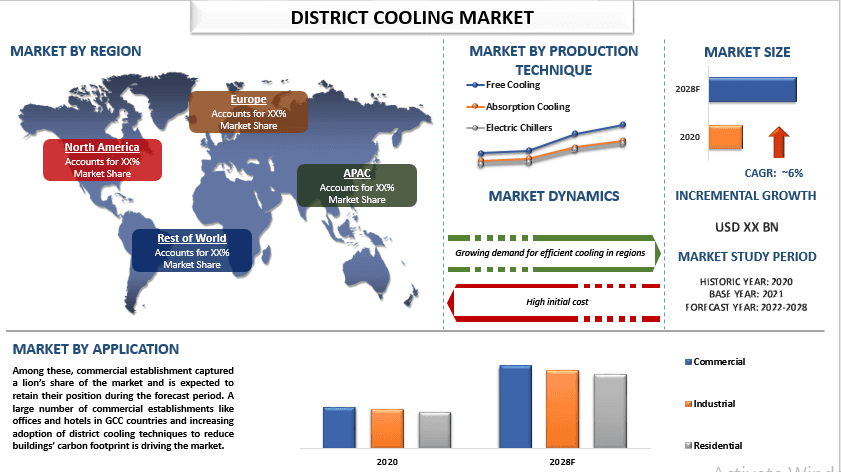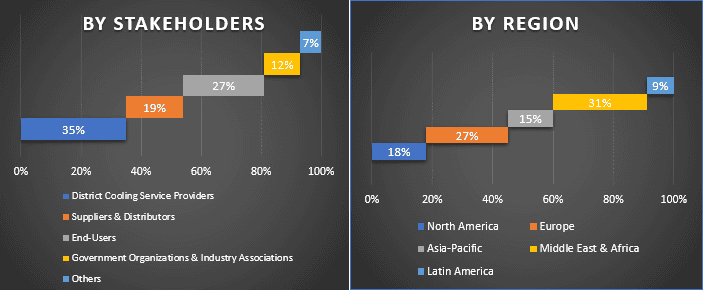
全球區域供冷市場預計在預測期內將呈現約 6% 的成長。住宅和非住宅環境中對舒適冷卻和製程冷卻的需求不斷增長,加上區域供冷提供的商業利益和減少峰值用電量,正在增加區域供冷專案的數量。包括投資者擁有的電力公司、政府擁有的公用事業公司、私營區域能源公司、大學、機場和 IT 園區等各種類型的組織正在全球範圍內實施該專案。除此之外,如果與區域供冷系統整合,全球的綠建築趨勢可能會更加有效。建築業主和租戶要求建築設計和服務達到更高的環境標準。區域供冷與建築效率措施相結合可以顯著改善綠建築認證,尤其是當區域供冷系統可以利用單一建築層面無法獲得的廢熱或再生能源時。此外,隨著各國正在建設智慧城市,預計區域供冷系統的數量將會增加。
報告中呈現的洞見
「在生產技術中,電動冷水機組可能呈現正向成長趨勢」
根據生產技術,市場分為自然冷卻、吸收式冷卻和電動冷水機組。其中,電動冷水機組預計將廣受終端用戶的青睞,因為與其他類型相比,它可以更有效地減少峰值用電量。此外,缺乏可用清水也是電動冷水機組越來越受歡迎的主要因素之一。
「在應用方面,商業環境在 2020 年的市場中佔據顯著地位」
根據應用,市場分為商業、工業和住宅。其中,商業機構佔據了市場的大部分份額,預計在預測期內將保持其地位。海灣合作委員會國家的大量商業機構,如辦公室和飯店,以及越來越多地採用區域供冷技術來減少建築物的碳足跡,正在推動市場發展。
「中東和非洲在 2020 年佔有重要的市場份額」
為了更好地了解區域供冷市場的採用情況,我們根據其在全球各國的存在情況分析了市場,例如北美(美國、加拿大)、歐洲(德國、法國、瑞典、挪威、義大利和歐洲其他地區)、亞太地區(中國、日本、韓國和亞太地區其他地區)、中東和非洲(沙烏地阿拉伯、阿拉伯聯合大公國、卡達和中東和非洲其他地區)以及拉丁美洲(巴西、阿根廷和拉丁美洲其他地區)。中東和非洲是區域供冷系統技術的主要採用者之一。該地區炎熱的氣候條件使空調成為一種必需品,而不是一種奢侈品。因此,空調消耗了中東地區約 50% 的峰值電力負載。這促使區域經濟體將重點轉向區域供冷,以減少電力消耗,進而也有助於減少二氧化碳排放。大型建設活動以及在新建築中偏好區域供冷系統正在推動中東和非洲區域供冷市場的發展。
購買本報告的理由:
- 該研究包括由經過驗證的主要行業專家驗證的市場規模和預測分析
- 該報告以一目了然的方式快速回顧整體行業績效
- 該報告深入分析了主要的行業同行,主要關注關鍵業務財務、產品組合、擴張策略和近期發展
- 詳細分析了行業中存在的驅動因素、限制因素、關鍵趨勢和機會
- 該研究全面涵蓋了不同細分市場的市場
- 深入分析了行業的國家層面
客製化選項:
全球區域供冷市場可以根據需求或任何其他市場區隔進一步客製化。除此之外,UMI 了解您可能會有自己的業務需求,因此請隨時與我們聯繫,以獲得完全符合您需求的報告。
目錄
全球區域供冷市場分析 (2020-2028) 的研究方法
分析歷史市場、估計當前市場以及預測區域供冷的未來市場,需採取三個主要步驟來建立並分析其在全球的採用情況。進行詳盡的二級研究,以收集歷史市場數據並估計當前市場規模。其次,為了驗證這些見解,考慮了無數的發現和假設。此外,還與行業價值鏈中的行業專家進行了詳盡的初步訪談。在通過初步訪談假設和驗證市場數據之後,我們採用自下而上的方法來預測完整的市場規模。此後,採用市場細分和數據三角剖分方法來估計和分析行業相關的細分市場和子細分市場的市場規模。詳細方法如下所述:
歷史市場規模分析
步驟 1:深入研究二級來源:
進行了詳細的二級研究,以通過公司內部來源(例如年度報告和財務報表、業績演示文稿、新聞稿等)和外部來源(包括期刊、新聞和文章、政府出版物、競爭對手出版物、行業報告、第三方數據庫和其他可信出版物)獲取區域供冷的歷史市場規模。
步驟 2:市場細分:
在獲得區域供冷市場的歷史市場規模後,我們進行了詳細的二級分析,以收集主要區域不同細分市場和子細分市場的當前市場見解和份額。報告中包含的主要細分市場按生產技術和應用分類。此外,還進行了區域和國家級別的分析,以評估全球區域供冷的總體採用情況。
步驟 3:因素分析:
在獲得不同細分市場和子細分市場的歷史市場規模後,我們進行了詳細的因素分析,以估計區域供冷的當前市場規模。此外,我們使用相關和獨立變量進行了因素分析,例如對高效冷卻的需求不斷增長以及基礎設施領域的投資不斷增加。我們對需求和供應側情景進行了徹底的分析,同時考慮到區域供冷行業中不斷增加的投資、頂級合作夥伴關係、併購、業務擴張和產品發布。
當前市場規模估算與預測
當前市場規模:基於上述 3 個步驟的可行見解,我們得出了當前市場規模、全球市場中的主要參與者以及每個細分市場的市場份額。所有需要的百分比份額分配和市場細分都是使用上述二級方法確定的,並通過初步訪談進行了驗證。
估算和預測:對於市場估算和預測,我們為不同的因素分配了權重,包括驅動因素和趨勢、限制因素以及利益相關者可用的機會。在分析這些因素後,我們應用了相關的預測技術,即自下而上的方法,以得出 2028 年全球主要區域不同細分市場和子細分市場的市場預測。用於估算市場規模的研究方法包括:
- 該行業的市場規模,就價值(美元)以及主要市場中區域供冷的採用率而言
- 市場細分市場和子細分市場的所有百分比份額、分配和細分
- 區域供冷市場中的主要參與者。此外,這些參與者為在快速增長的市場中競爭而採用的增長策略
市場規模和份額驗證
初步研究:與主要區域的高級意見領袖 (KOL) 進行了深入訪談,包括高級管理人員(CXO/副總裁、銷售主管、市場主管、運營主管、區域主管、國家主管等)。然後總結了初步研究結果,並進行了統計分析以證明所述假設。初步研究的輸入與二級研究結果合併,從而將資訊轉化為可行的見解。
主要參與者按利益相關者和地區的劃分

市場工程
採用數據三角剖分技術來完成整體市場估算,並得出全球區域供冷市場各個細分市場和子細分市場的精確統計數據。在研究了區域供冷生產技術和應用領域的各種參數和趨勢後,數據被分成幾個細分市場和子細分市場。
區域供冷市場研究的主要目的
研究中指出了全球區域供冷的當前和未來市場趨勢。投資者可以獲得戰略見解,以便根據研究中進行的定性和定量分析來決定投資。當前和未來的市場趨勢將決定市場在國家層面的總體吸引力,為工業參與者提供一個利用未開發市場以獲得先發優勢的平台。研究的其他定量目標包括:
- 分析區域供冷的當前和預測市場規模,就價值(美元)而言。此外,分析不同細分市場和子細分市場的當前和預測市場規模
- 研究中的細分市場包括區域供冷的生產技術和應用領域
- 定義了區域供冷行業的監管框架分析
- 分析與各種中介機構相關的價值鏈,以及分析行業的客戶和競爭對手行為
- 分析主要國家/地區的區域供冷當前和預測市場規模
- 報告中分析的主要地區/國家包括北美(美國、加拿大)、歐洲(德國、法國、瑞典、挪威、意大利和歐洲其他地區)、亞太地區(中國、日本、韓國和亞太地區其他地區)、中東和非洲(沙烏地阿拉伯、阿拉伯聯合大公國、卡達和中東和非洲其他地區)以及拉丁美洲(巴西、阿根廷和拉丁美洲其他地區)
- 區域供冷市場參與者的公司概況以及他們為維持增長中的市場而採用的增長策略
深入分析該行業的國家級別
相關 報告
購買此商品的客戶也購買了










